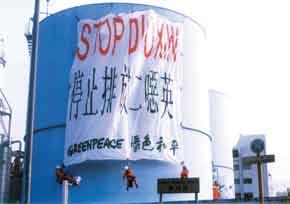Section 2: Evaluation Toxic Materials and Waste Management
Toxic Materials and Waste Management
BOCOG set ambitious waste management commitments
located in the Daxing District; Asuwei located in Changping
and saw the Olympics as a way to kick-start improving waste
District; Liulitun, located in Haidian district; and Gaoantun
management in the city.
in Chaoyang District.157 Landfill remains the primary waste
The environmental department of BOCOG in charge of waste management during the Games has set out a “Venue Cleaning and Waste Management Operation Outline” that includes various waste management standards, policies, and
treatment method for Beijing to date although the three new waste incineration plants to be brought on line in time for the Games may signify a shift towards incineration as a popular method of waste treatment.158
procedures. In 2004, the primary method of the treatment of waste was 89.6% landfills, 5.8% composting and 4.6% incineration. At the end of 2006, Beijing had 23 domestic waste disposal facilities. Of the 23 existing facilities six are domestic waste transfer stations, 13 are landfills and four are comprehensive processing
plants.
Only
three
stations,
the
Shunyi
Comprehensive Processing Plant, The Nangong Composting Plant and the Huairou Comprehensive Processing Plant offer composting service. According to official figures, 4.13 million tonnes were produced in the eight central districts, where overall processing capacity was close to 3.989 million tonnes
Beijing Commitments
By 2008, the Beijing municipal
1. To implement a safe urban domestic waste disposal
government plans to build 15 new garbage treatment facilities
system by 2007 and to establish processing facilities
to process 12 500 tonnes of waste daily. This includes three
for non-hazardous urban waste in the Beijing suburban
new landfills, seven new comprehensive processing plants,
area.159
(processing rate: 96.5
%).153
three new incineration plants, and two transfer stations.154
2. To safely treat and dispose of all solid wastes produced
In 2003, Beijing introduced its first incineration plant in
in the city by 2008, 50% of the solid wastes will be
Gaoantun, which can process about 1600 tonnes of waste
separately collected and 30% recycled for use as
per
day.155
Beijing authorities see the introduction of waste
incineration plants as a gain for the city as they use the
resources. All solid wastes produced during the Games will be separately collected and disposed of.160
latest German technology to treat flue gas while eliminating
3. To construct disposal facilities for hazardous waste with
the amount of land taken up by landfills. It is reported that
a total capacity of approximately 10 000 tonnes a year
by 2010, there will be four incineration plants constructed
(which includes processing and disposal of medical
in Beijing.156 These incineration plants are: Nangong,
and radioactive waste) for Beijing.161
153 UNEP, “Beijing 2008 Olympic Games: An Environmental Review,” p.132. 154 Xinhua. “Beijing’s primary medical waste facility is constructed, Beijing is able to process 93% of waste in the city.” http://news.xinhuanet.com/newscenter/2004-12/28/ content_2388684.htm 155 2003 Beijing economic development update. http://www.sei.gov.cn/ShowArticle2008.asp?ArticleID=85572(in Chinese) 156 “Beijing builds cogeneration plants, the first garbage facilities will be constructed this year.” http://2008.people.com.cn/GB/22180/46353/4182524.html. 157 “Friends of Nature”http://www.fon.org.cn/content.php?aid=9230. (in Chinese) 158 Xinhua. http://news.xinhuanet.com/newscenter/2004-12/28/content_2388684.htm (in Chinese) 159 UNEP, “Beijing 2008 Olympic Games – An Environmental Review.” p.132. 160 BOBICO, “Section Four: Environmental Protection and Meteorology” p.57. 161 UNEP, “Beijing 2008 Olympic Games – An Environmental Review.” p.132.
33











